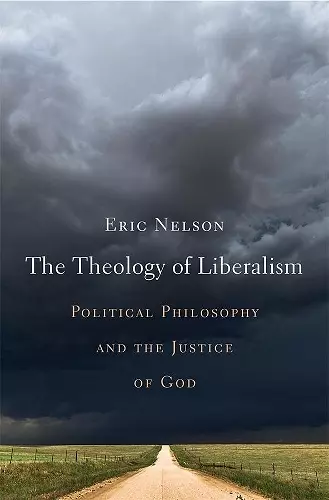The Theology of Liberalism
Political Philosophy and the Justice of God
Format:Hardback
Publisher:Harvard University Press
Published:25th Oct '19
Should be back in stock very soon

One of our most important political theorists pulls the philosophical rug out from under modern liberalism, then tries to place it on a more secure footing.
We think of modern liberalism as the novel product of a world reinvented on a secular basis after 1945. In The Theology of Liberalism, one of the country’s most important political theorists argues that we could hardly be more wrong. Eric Nelson contends that the tradition of liberal political philosophy founded by John Rawls is, however unwittingly, the product of ancient theological debates about justice and evil. Once we understand this, he suggests, we can recognize the deep incoherence of various forms of liberal political philosophy that have emerged in Rawls’s wake.
Nelson starts by noting that today’s liberal political philosophers treat the unequal distribution of social and natural advantages as morally arbitrary. This arbitrariness, they claim, diminishes our moral responsibility for our actions. Some even argue that we are not morally responsible when our own choices and efforts produce inequalities. In defending such views, Nelson writes, modern liberals have implicitly taken up positions in an age-old debate about whether the nature of the created world is consistent with the justice of God. Strikingly, their commitments diverge sharply from those of their proto-liberal predecessors, who rejected the notion of moral arbitrariness in favor of what was called Pelagianism—the view that beings created and judged by a just God must be capable of freedom and merit. Nelson reconstructs this earlier “liberal” position and shows that Rawls’s philosophy derived from his self-conscious repudiation of Pelagianism. In closing, Nelson sketches a way out of the argumentative maze for liberals who wish to emerge with commitments to freedom and equality intact.
[One] of the best treatments imaginable of the context and meaning of Rawls’s epoch-making book…Illuminating and original…Nelson also places Rawls in the theological tradition better than anyone so far…A great and rewarding book. -- Samuel Moyn * Commonweal *
Effortlessly combines early Christian theology, modern political philosophy, historical scholarship, literature, and economic theory to present a cogent but unorthodox critique of one of the great foes of liberal democratic capitalism: the philosopher John Rawls. -- Tal Fortgang * Commentary *
An excellent work, magnificently well done and provocative in all the right ways. -- Christopher Brooke, University of Cambridge
Since the first publication of A Theory of Justice some critics have argued that John Rawls’s liberalism rests on a commitment to a questionable view of the self. Eric Nelson now raises the stakes with a critique that interrogates liberal accounts of human agency not just metaphysically but theologically. Nelson’s work is marked by a unique combination of erudite scholarship, lucidity, analytical forcefulness, and the willingness to question received views. He has developed an original case and argued it with great power. His book represents a challenge that cannot be ignored. -- Michael Rosen, Harvard University, author of Dignity
The Theology of Liberalism is a remarkable, original, and provocative book with stylish and engaging prose that offers a major intervention across several fields that are all too often artificially segregated: intellectual history, normative political theory, and theology. By showing the afterlife of old debates about grace and theodicy, Nelson breathes new life into today’s contested discussions of freedom, equality, and the liberal tradition. -- Eric Gregory, Princeton University
Not everyone will be convinced by Eric Nelson’s assertion about the place of Pelagian theology in the foundations of what we now call early modern liberalism. But scholars need to take his arguments seriously, and those who do will profit from the thoughtfulness of his writing, the learned character of his analysis, and the originality of his insights. -- Jeremy Waldron, author of One Another’s Equals
Fascinating…Nelson’s historical acuity makes his book well worth reading. -- Daniel Luban * Dissent *
Tantalizing analysis…Nelson’s historical arguments are thorough and detailed. * Publishers Weekly *
It will be read as long as Rawlsian liberalism remains a political philosophy to be reckoned with…There are few books that combine precise and original historical scholarship with theoretical depth and sophistication. This is one of them. -- James Hankins * Law & Liberty *
Having so masterfully dismantled the reigning justification for redistributive justice, we can only wish that he now uses his extraordinary intellect and vast erudition to help us devise a new one. -- Helena Rosenblatt * Perspectives on Politics *
An intricately reasoned and richly documented alternative to Rawlsian redistributive theory. -- David Hoekema * Christian Century *
A coherent intellectual attempt to address the challenges arising from left-libertarianism. -- Roger Drinnon * Concordia Journal *
This is an important book for readers interested in the intersection of theology and liberal theory. -- Aaron Klink * Religious Studies Review *
ISBN: 9780674240940
Dimensions: 235mm x 156mm x 20mm
Weight: 454g
232 pages